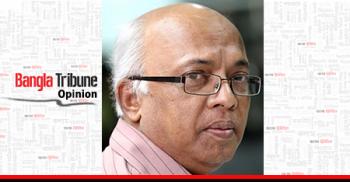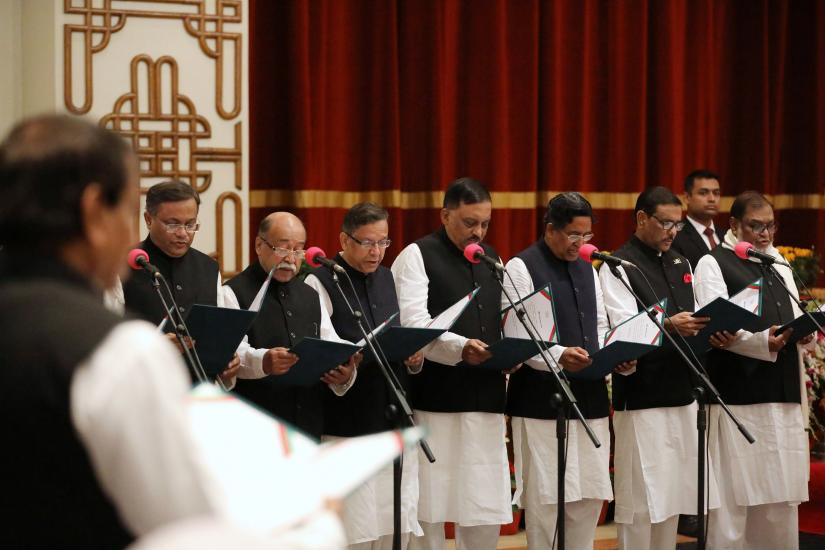 A few days ago, at the first meeting of the new council of ministers, Prime Minister Sheikh Hasina directed the new cabinet ministers to work with sincerity and devote their energies to ensuring the welfare of the citizens of Bangladesh. It was just as well, especially considering the moral and constitutional truth that ministers and all other elected officials hold their positions fundamentally, indeed only, to serve the people. Given that all political and administrative power is a responsibility to be carried out by those entrusted with the task, ministers and lawmakers need not be reminded of their duties.
A few days ago, at the first meeting of the new council of ministers, Prime Minister Sheikh Hasina directed the new cabinet ministers to work with sincerity and devote their energies to ensuring the welfare of the citizens of Bangladesh. It was just as well, especially considering the moral and constitutional truth that ministers and all other elected officials hold their positions fundamentally, indeed only, to serve the people. Given that all political and administrative power is a responsibility to be carried out by those entrusted with the task, ministers and lawmakers need not be reminded of their duties.
It is enough that at the time of their swearing-in they make a pledge to abide by the Constitution and to serve the nation, without fear or favour or prejudice, in conformity with the provisions of the Constitution. Even so, one cannot but appreciate the fact that Prime Minister Sheikh Hasina has taken it upon herself to remind the new ministers, ministers of state and deputy ministers of the responsibilities they are expected to carry out in the service of the nation. As citizens glued to the idea of democracy being an essential underpinning of life in this country, we expect the cabinet to work according to the instructions of the head of government, indeed in full and absolute loyalty and subservience to the state and its constitution.
Of course, on this subject of the manner, in which our ministers should work there is a whole tranche of thoughts to be worked on, given that in these past many decades a great deal was left to be desired where ministerial performance was concerned.
In these new circumstances which have arisen following the general election of last month, it surely must be pointed out that ministerial jobs are of a crucial nature and of critical importance for the country, entailing work that is to be done every second and every minute of the day.
It is a twenty-four hour job. That is a good reason why ministers must be seen as little as possible outside their workplaces. In a part of the world where much ministerial time and energy is lost in activities with little or no relevance to the portfolios ministers hold, a new culture of our ministers spending their valuable hours in their offices dealing with issues of public significance must make inroads into our political heritage.
All too often in the past, ministers were seen attending a number of programmes away from their offices, sometimes day after day. That necessitated a large number of their senior officials generally accompanying them to these functions, in the process of which work related to the public interest in the ministries they presided over suffered. It is unhealthy for a society, democratic or otherwise, for such a culture to be in place because it is culture which makes of citizens’ concerns and time and resources a huge casualty.
There are a large number of citizens waiting out there for their worries about their families, about their security of food and their children’s education and about a provision of equal opportunities to be addressed by the ministers or their officials. It is a concern which our new ministers ought to be seized of as they go about their work.
 A particular area where ministers must exercise restraint, indeed be circumspect, is in speaking of subjects that do not fall within the purview of their responsibilities. When ministers go beyond their portfolios and wade into regions lawfully and administratively not within their purview, administration is threatened with sloth, with the possibility of being pushed into a state of atrophy. The prime minister should make it absolutely clear to her ministers that they cannot and must not go beyond their remit when they speak to the media or anywhere else. The structure of the cabinet is clear about the role of ministers, who cannot but act and speak in line with the portfolios they hold. Therefore should they not step into territory that is obviously and naturally and constitutionally the preserve of their colleagues. At the same time, it is of the utmost importance that ministers, unless they are faced with issues of an immediate nature which need to be placed in the public domain, should resist every temptation to speak to the media, to be seen on television more than they should.
A particular area where ministers must exercise restraint, indeed be circumspect, is in speaking of subjects that do not fall within the purview of their responsibilities. When ministers go beyond their portfolios and wade into regions lawfully and administratively not within their purview, administration is threatened with sloth, with the possibility of being pushed into a state of atrophy. The prime minister should make it absolutely clear to her ministers that they cannot and must not go beyond their remit when they speak to the media or anywhere else. The structure of the cabinet is clear about the role of ministers, who cannot but act and speak in line with the portfolios they hold. Therefore should they not step into territory that is obviously and naturally and constitutionally the preserve of their colleagues. At the same time, it is of the utmost importance that ministers, unless they are faced with issues of an immediate nature which need to be placed in the public domain, should resist every temptation to speak to the media, to be seen on television more than they should.
Ministers who turn up early in the day in their offices and leave quietly at the end of the day having made decisions affecting the lives of millions, are properly deserving of public respect. Unfortunately, it has often been the citizen’s experience that whenever ministers were accosted by the media, they tended to respond cheerfully to questions that they simply could have done without.
The media scrum will always be there, sure. Journalists will always pelt them with questions. That is their job. It does not mean, though, that they must always be indulged with grandiose ministerial statements or fresh new sound bites. Our ministers must place value in the language of silence; they can simply walk through the questions the media throw at them, walk past them, a smile or a serious demeanour accompanying that adoption of attitude.
One last point: it is our natural expectation that our new ministers will remain accessible to citizens, will respond to citizens’ concerns through swift administrative action. They must ensure that hangers-on and sycophants and political loyalists do not crowd their offices, do not create the conditions that will slow down their work.
Ministers must be tough without losing their sense of compassion. They must be firm without being domineering. They must be strong leaders in the departments they have been assigned to supervise. They must be visionaries as they formulate policies for citizens, those inhabiting the land at present and those yet to be born.
Syed Badrul Ahsan is Editor-in-Charge, The Asian Age.


